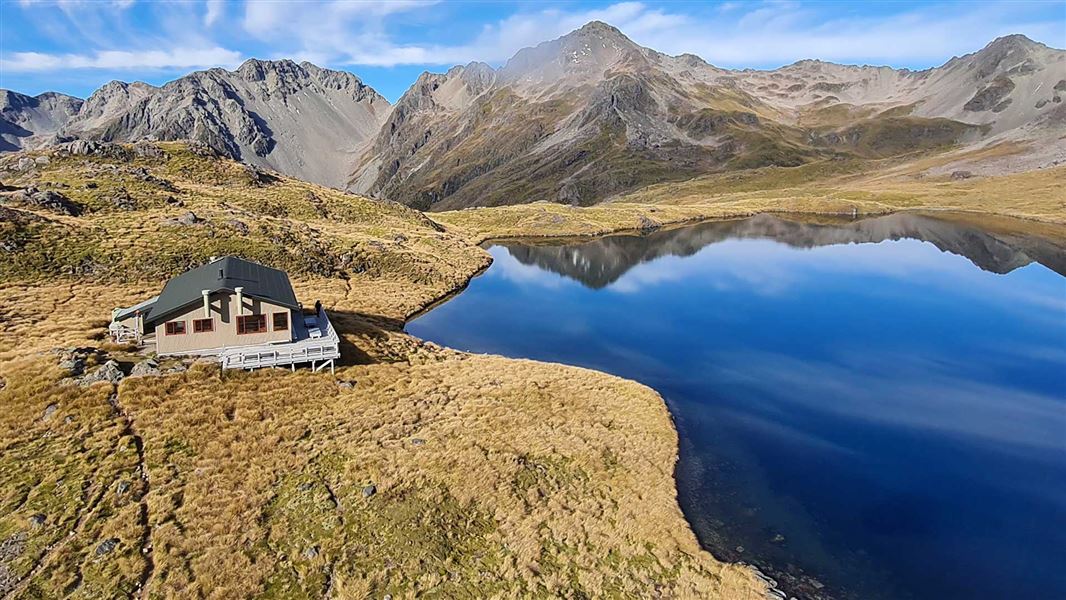Bookings required
May to October:
- Additional hazards on all routes to Angelus Hut including snow, ice, avalanche risk and sub-zero temperatures.
- Hut facilities reduced – water and firewood may not be available at the hut.
Bookings are required for Angelus Hut all year round.
Check conditions in the 'Know Before You Go' section below before you travel.
Image gallery
Angelus Hut at 1,650 metres, sits on the shores of Lake Angelus surrounded by spectacular mountain views. Angelus Hut Campsite is located outside the hut. Both the hut and campsite need to be booked year around.
From May to October in most years, the lake is frozen, snow blankets all four routes, and you may have to dig your way to the hut.
Facilities
- No cookers – bring your own.
- No rubbish bins – take your rubbish out with you.
Fees
Backcountry Hut Passes
Passes are valid for use in this hut from 1 May to 30 September. Passes won't be accepted from 1 October to 30 April.
Adult (18+ years): $30 per night.
Child/youth (5–17 years): $15 per night
Infant (0–4 years): free
Bookings
Bookings are open for stays up to 30 June 2025.
All bookings are first-come first-served. We do not have waiting lists for bookings for future seasons or facilities that are already booked-out.
Bookings are required all year.
A $10 service fee applies to phone and in-person booking. This is a limited service – book online first. An in-person booking is dependent on there being space available.
Your hut booking is for any bunk bed, not for a specific bunk bed – select your bunk bed on arrival.
Tracks to this hut
-
Duration: 2-3 days Difficulty: Advanced, Expert -
Duration: 6 hr Difficulty: Advanced, Expert -
Duration: 6 hr Difficulty: Advanced, Expert -
Duration: 6 hr Difficulty: Advanced, Expert -
Duration: 6 hr Difficulty: Advanced, Expert
Location
NZTopo50 map sheet: BS24
Grid/NZTM2000 coordinates: E1579151, N5362601
Altitude: 1,650 m above sea level
A hut warden will be on-site throughout the peak season.
Check the weather and current conditions before you go
Check the weather and the Mountain Safety Council's camera to help you plan and prepare.
Weather forecast
Angelus Hut weather forecast - NIWA website
Webcam for current conditions
The Mountain Safety Council have installed a webcam that faces southwest of the Angelus Basin. It provides data for avalanche forecasts and offers trampers a view of current conditions.
The image below is the latest available image from the webcam. The time it was taken is shown in the lower left corner:

Be aware there may be times when images from the webcam are unavailable or inconsistent due to the remote location.
View previous images on the Mountain Safety Council's website.
Understand if you are ready for this tramp
Watch the NZ Mountain Safety Council’s walk-through video which takes you through how to prepare for this track. Including facilities, key decision points, hazards and typical conditions for the area.
Nelson Lakes - thefts from vehicles
Isolated carparks are prone to theft. Don't leave any valuables in your vehicle. A bag storage facility is available at the Rotoiti/Nelson Lakes Visitor Centre.
Keep alpine lakes and tarns free of lindavia (lake snow)
The invasive alga lindavia is present in Lakes Rotoiti and Rotoroa. It causes lake snow – a sticky mucus that hangs below the surface of the water.
Make sure all your gear is completely dry for 48 hours before swimming or taking water from any alpine lake or tarn, including Rotomaninitua/Lake Angelus.
Use a biosecurity cleaning station at Coldwater Hut, Lakehead Hut and Sabine Hut to disinfect any boots, socks, clothing, towels or drink bottles that are wet or damp from lake or river water.
Do not touch the water in Rotomairewhenua/Blue Lake and Rotopōhueroa/Lake Constance.
Be extra careful if you’ve recently swum or filled a drink bottle from Lakes Rotoiti or Rotoroa.
There may be avalanche danger
Nelson Lakes National Park has a variety of avalanche paths in the Travers, Sabine, Matakitaki and numerous side valleys. For information on current avalanche danger, refer to the New Zealand Avalanche Advisory.
If you are going into avalanche terrain, always:
- Have the relevant avalanche skills and training.
- Check the ATES rating and the New Zealand Avalanche Advisory before you go.
- Go with a buddy. Both of you should carry and know how to use an avalanche transceiver, a snow shovel and a probe.
Nelson Lakes National Park Visitor Centre
| Phone: | +64 3 521 1806 |
| Email: | nelsonlakesvc@doc.govt.nz |
| Address: | View Road St Arnaud 7072 |
| Hours: | Visitor centre hours and services |
Whakatū/Nelson Visitor Centre
| Phone: | +64 3 546 9339 |
| Email: | nelsonvc@doc.govt.nz |
| Address: | Millers Acre/Taha o te Awa 1/37 Halifax Street Nelson 7010 |
| Hours: | Visitor centre hours and services |
